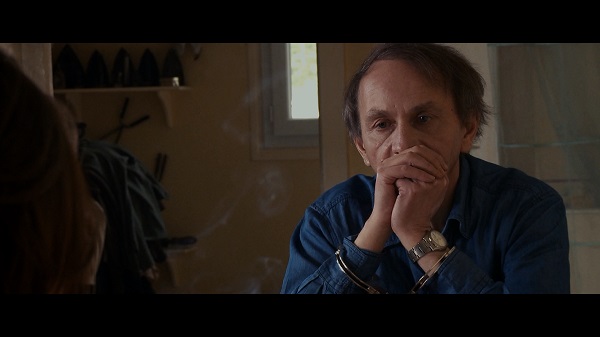Tribeca Reviews — Filling In the Blanks: ‘The Kidnapping of Michel Houellebecq’

Michel Houllebecq stars as himself in “The Kidnapping of Michel Houllebecq.” LES FILMS DU WORSO ©. Photo Courtesy of: The Tribeca Film Festival.
It’s fitting that Guillaume Nicloux’s L’enlèvement de Michel Houellebecq (The Kidnapping of Michel Houellebecq) opens with two men sitting around a kitchen table in a Parisian apartment, smoking and wryly speaking of ways to remodel the culinary room. As an entry point into the movie, Nicloux, the writer and director of the French flick, quickly establishes the universe of the ensuing 97 minutes of cinema: extended flurries of conversation ranging from the serious to the farcical and the philosophical to the mundane, taking place within the setting of a domicile and all of it packaged in a documentary semblance.
As the title hints, the film’s story centers on Michel Houellebecq, a real-life, celebrated écrivain (writer) who disappeared mysteriously for several days in 2011 while touring to promote his new novel. The Frenchman, notoriously secretive and reclusive, never divulged the reason for his absence, but the media speculated broadly about Houellebecq’s whereabouts during this time period, going so far as to suggest that he had been abducted by Al-Qaeda. Nicloux plays off these overblown musings and lack of a firm explanation from the author (who plays himself in the movie), presenting a comedic, fictionalized narrative posing as the “truth” of what really occurred. And what yarn did the filmmaker spin? A kidnapping by a family of three brothers (a motley crew consisting of Max, a bodybuilder; Mathieu, a mixed-martial-arts fighter; and Luc, an overweight, short-tempered fellow) along with their mother and father, who whisk Houellebecq away to an undisclosed area of the French countryside in hopes that someone will cough up a handsome sum of cash in ransom.
This home in the banlieues (suburbs) is the focal point of the movie’s action, although the plot doesn’t turn out to be the thriller the title may indicate. After they capture Houellebecq, the family essentially treats him like a pampered guest (if you overlook the handcuffs): when he feels ill, the family calls in a doctor; when the doctor prescribes relaxation for the patient, they buy him a female escort as a remedy; and when the literary figure asks for a second night call from the young woman, they acquiesce. At one point, Houellebecq even thanks the family members for making captivity enjoyable. In all, the film’s kinesis comes mainly through playful, poignant dialogue, most of it prolonged conversation around the dinner table over a few glasses of wine or a meal à la française, although situational comedy nicely supplements the chatter (teaching the 58-year-old Houellebecq how to whistle or perform some essential MMA chokeholds are two especially amusing exposés).
Cinematographer Christophe Offenstein shoots much of the goings-on via handheld camera, contributing to the home-movie-type feel of the picture, while Houellebecq and his supporting troupe of actors underpin the camera’s naturalism through bang-up performances whose strength derives from their understated delivery. If vocal interplay is the heart of the film, though, Houellebecq is its pulse. He could pass for one of the premier faces of French cinema rather than its famed auteur, delightfully translating his subdued, whimsical personality and incisive, tongue-in-cheek critiques to the screen.
For someone who purposefully stays out of the public spotlight, Houellebecq here is surprisingly open (to the extent that his true self, rather than Nicloux’s vision of him, is on display). The writer-director has said that one of his aims in The Kidnapping of Michel Houellebecq is to reveal “the kind of man we don’t expect to meet.” The film certainly succeeds in its representation of a witty, sensitive, sharp-minded individual, and whether or not this image is the one we anticipated is of little consequence. Ultimately, it’s hard not to be won over by Houellebecq, just like our band of “criminals,” and the film’s take on reality and view into French culture. Its vibe is so feel-good that we can’t help but hope that, strangely enough, Houellebecq was indeed the “victim” of this contrived racket.
Rating: 3 out of 4 stars
“The Kidnapping of Michel Houellebecq” is making its North American premiere in the World Narrative Competition of this year’s Tribeca Film Festival, which runs from April 16-27. The film will be premiering at 5:30 p.m. on Friday 4/18 at Bow Tie Cinemas Chelsea 4. For a full list of screening dates and to purchase tickets, please visit http://tribecafilm.com/filmguide/53208b54c07f5df7d2000910-kidnapping-of-michel-houe.

